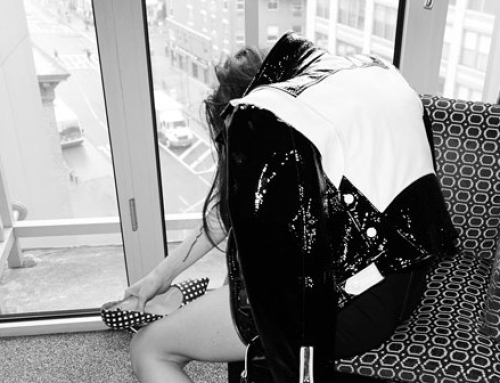Rebellion in Hollywood is a predicable hand, a calculated mess of recycled personas, dramas and dips. Typically triggered following the mainstream success of an indie film in which a talented young actor gives an emotional performance as a disturbed youth — said actor begins shaping his/her nonconformist attitude in and around the end of the last of the big international film festival, a few months before the Oscars, when the actor emerges in the media as a dark enigma, prime for controversial sound bites. Photographs of them looking disheveled and tired begin popping up, along with magazine interviews that read like rifts on The Brothers Karamazov. Like so much of what is manufactured out of Hollywood, its brand of rebellion seems almost scripted.
But, in the case of 18-year-old actor Ezra Miller — star of this international film festival season’s golden ticket, We Need to Talk About Kevin, the much hyped about Palme d’Or-nominated Festival de Cannes hit — there’s nothing “Hollywood” about the quirks of this self-described “well-intentioned degenerate” — least of all predictability.
Miller arrives at the Empire Hotel for our photo shoot precisely on time, free of manager and handlers. He’s dressed like an art student from the 70s — and smells like one too. After going around and introducing himself to the team, he immediately makes his way to the gold mask on the dresser where the stylist has organized the female models’ accessories. He turns serious as he begins to preach the virtues of packing a mask in one’s bag at all times, before setting down the prop and reaching into his canvas tote bag to retrieve his own gold metallic mask. Without missing a beat, he pulls the mask on over his head and demonstrates how to scare off assailants by feigning insanity.
It’s clear off the bat, Miller is not the type of person to build a persona; or if he is, than he’s an architectural genius when it comes to creating one with diverging character traits stark enough to render it impossible to pin down.
It’s no wonder the actor is drawn to roles like that of the title character in We Need To Talk About Kevin. To describe his character as “disturbed” would not do the intricacy of Kevin’s psychosis, or its sociological reverberations, justice. Setting out to play duel parts in his own life, Kevin’s split personality develops from a deep rooted disconnect with his mother, which quickly expands to encompass greater society, leaving the audience spending the entirety of the film trying to figure out what has triggered Kevin’s descent into mass violence against his classmates and family — and whether it was a step down from his sense of “normalcy” at all.
Intelligent, polite and humble — we caught up with the introspective young Miller a few weeks before the Toronto International Film Festival premiere of We Need to Talk About Kevin to dissect the inner workings of his character, the malaise afflicting his generation and the Hollywood effect. A deep conversationalist with thoughts that speed along heavy and ideologically loaded, the only way to share any insight into the actor’s personality and career’s work justly is to present you with his own words on the subjects, and so, below is FILLER’s meditative chat with actor Ezra Miller.
Lionel Shriver novel, We Need to Talk About Kevin, made quite the stir back in 2003 when it was published, as your film has since its premiere at Cannes. Were you familiar with the book before you auditioned for the role?
No, I had not heard prior tell of Kevin. The eerie thing, though, was how quickly I felt I knew the words all too well. As an American teenager, this script hit me fast and hard as a largely untold story. That of my generation’s great plight, as sprouting from our privilege (the deficits and surpluses) and all of our many murders, as sprouting from our Mother (her or our actions and our or her reactions.)
view gallery
The content spoke to you then?
Oh yes, as I recall that creeping familiarity had effortlessly ascended my whole spinal column by the time I finished page 1.
Kevin is such a multilayered character, you never quite know what he’s thinking or feeling, was it difficult to communicate this in your acting?
Well, Kevin knows exactly what he’s thinking. You as the audience don’t, as a result partially of his meticulous manipulation and particularly because you look at Mr. Kevin Katchadourian through Eva’s mind and memory only.
Judging from your performance, I’d say you got a pretty firm grip on your character’s mindset. Unearth anything particularly useful about Kevin’s personality in your preparation for the part?
I found in my investigation of the boy that two umbrella aspects of the character served the purpose of encompassing all the others. It’s a duality that could be explored in any person. On one end is what I thought of as essential Kevin: the core elements of his being as dictating his true needs and wants. The other is motivational mind: the insatiably churning brilliance that dictates and invents his focused actions and justifications.
And how did you filter this discover into your performance?
I found this time-honored psychological dichotomy useful in my whole game with this film, actively preparing spiritual, emotional, physical, and energetic Kevin in the time proceeding production so that when the war of production rushed us along, I could just let Kevin exist in his own perception, thoughts and motives.
When watching the film, I found it hard to figure out what Kevin was thinking — what motivated him, how his perspective shaped his relationships with others etc. How did you connect with the character, or could you relate at all?
Oh, come now, Kevin’s a very relatable young man. Everyone knows a Kevin or two. I mean I found him to be such a raw archetype that he’s practically applicable to a piece of anyone’s deep psyche. Read up your old high school copies of Sophocles. Modern Western living is like a machine gun, rapid fire spitting Oedipus complex-riddled souls into a dark lack of societal understanding. The bodies start turning up eventually.
This draws to mind the question of nurture vs. nature: is Kevin born “bad” or raised to be “bad” based on his emotional environment from the womb onwards?
Have any of the babbling academics hatched an answer on this over-plucked age-old debate? I’m confused as to how anyone delineates or decides something like that when nature so radically informs the way you come to nurture and the nurture you receive so radically affects the way you… well… nature [i.e.] sensing, being, fucking, killing, giving birth, dying, etc, etc ad deep ol’ nauseam.
Describe our complex anti-hero in one sentence.
A motherless child who sees his mother every single day.
Pretty spot on description. Let’s move on to Kevin’s parents — his judging mother and his forgiving father, what’s the dynamic like between him and each of them?
They’re both very classic foolish tragic heroes, felled by their own faults at the feet of their own loins, flesh, blood and brains. I think it’s a common feeling amongst parents these days.
From our chat alone, it’s pretty clear that this film encompasses quite a bit of heavy subject matter; do you find it difficult to turn off the emotions of your character when off set?
Sometimes, in these early parts of my exploration of this acting puppetry game, I’ve strongly felt at times that it’s my job to not turn it off till the work is done. Don’t worry about us mad artists though; we lay our whole lives in fiendish wait of those projects worthy of costing us parts of our lives or sanities.
Page 1 of 2 >













